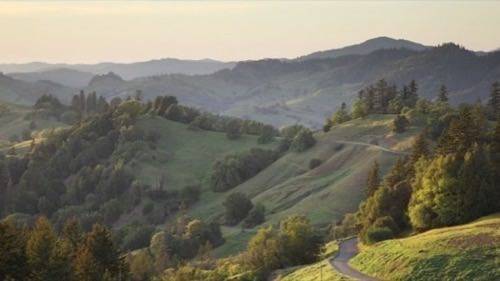
What am I even doing back on the Internet? I just got back from The Digital Detox. It was the third four-day retreat run by founders Levi Felix and Brooke Dean encouraging tech-addled people to slow down. It’s priced on a sliding scale between $450 and $950, with scholarships available. The retreats are held at Orr Hot Springs in Northern California, and more exotic locations are planned for the future.
I knew I needed it. Blogging makes my brain hurt. But I was just expecting a nice break. I didn’t know the experience would change me, and the amazing group it brought together, hopefully forever. My mind is crystal clear, and I’m happier than I’ve been in months. Before you start sneering about hippies and yoga, let me set the record straight: This off-the-grid retreat was the highest-tech thing I’ve done in a long time.
That’s right — retreating to a natural hot spring tucked away in a valley with no computers is high tech, and the 12 of us who attended this long weekend are lucky early adopters. We downloaded new versions of ourselves. Now that I’m finished installing mine, I’m back online, but it’s going to be different now.
I found out about the retreat from my friend, Micah, a vibrant technologist brimming with ideas, who knew Brooke and Levi. After burning out on the blistering pace of start-up life, Levi quit his job, and he and Brooke lived nomadically for a couple years. The slower, more intentional lifestyle they learned in their travels inspired them to offer these retreats for others.
So last Thursday Micah and I picked up two passengers we’d never met at the BART station in Berkeley, shut off our phones and drove three hours north, chatting excitedly along the way. We drove through the mountains and valleys near Ukiah, then turned off a winding country road, pulling up to an encampment of low, wooden buildings nestled into the side of a hill.
We checked our phones at the door. No Instagramming. If you want to capture something, write it down or draw a picture.

At the first dinner, Levi admitted that he wanted to “hack our brains.” Talk about disruptive. Actually, don’t. “Disruptive” is probably the most terrible tech buzzword there is. All technology can be disruptive. It can disrupt our attention, it can disrupt our memory, and it can disrupt our relationships.
From my journal:
In the redwoods…
The quiet and the slowness of these massive beings feels so good. My mind feels like it’s healing from years of damage and noise. Poor thing. It’s just going to be irradiated all over again in a couple days.
We shared most of the spaces — except the private sleeping yurts — with the group. We woke up early, did yoga, ate vegetarian meals full of fresh fruits and vegetables and gluten-free grains that were unbelievably good, and we meditated before bed. And we talked. We talked all day about where we came from, where we were, and where we were going. We slowed down, and we zoomed out.
Give advice to yourself in the past:
Dear Jon,
Do exactly what you’re doing now, but notice how awesome all of it is. You live in the future!
On the second night, we entered a 12-hour period of total silence that began at dinner. That was the hardest part. With no notifications to check and no feeds to read, we were alone with our thoughts. That was the turning point.
Changing How We Work
There weren’t many rules, but the most important one was no talking about work. Don’t make anyone else think about it. Inevitably, we would talk about work in general terms as we discussed the roles of technology in our lives. But none of us could say what we do specifically, and that was just as liberating as the offline part.
We began to call work “The W Space,” which became just one of the many fake buzzwords we coined to make fun of meaningless tech words. My favorite of those was “decelerator,” which my friend Micah made up. “If you have a start-up, you need to slow down,” Levi said. Micah called it exactly. Tech workers need decelerators. We can’t handle the information load without them.
I realized this weekend that I used to love computers unconditionally, but I’ve begun to hate what they do to us. At least, that’s how I put it at the beginning of the retreat. By the end, I realized that we do it to ourselves. Tech is only getting more pervasive, so we’ve got to get better at using it.
We who attended this retreat are very, very lucky. Disconnecting is a privilege. We missed work for this. Not everyone has that freedom. But we all need it. My hope for The Digital Detox is that it inspires a bunch of lucky people in tech to realize that they need this, their colleagues need it, their employees need it, and the future world they’re building needs it.
Here’s our advice based on what we learned about ourselves on those four days. Take it or leave it:
Make rules for yourself. No devices in the bedroom. No devices during meals. Set up your work around concentration, not interruption. The hardest thing about high-tech life is multitasking, thinking about multiple situations at once. Just try to do one thing at a time. That’ll be a good start.
Lead image courtesy of The Digital Detox

















